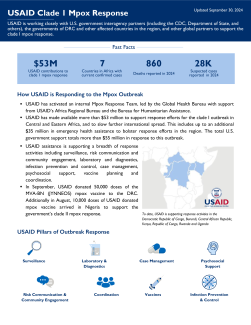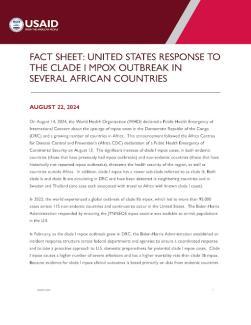The United States government is coordinating with several Central and Eastern African governments and other international partners to actively support response efforts for the clade I mpox outbreak in the Democratic Republic of the Congo (DRC) and neighboring countries.
Mpox is a potentially deadly disease caused by infection with a virus known as Monkeypox virus. Mpox is a zoonotic disease, meaning it can be spread between animals and people. Clade I refers to one of two types of the mpox virus and can cause more severe illness and death. While the virus is endemic, or found regularly, in parts of Central and Eastern Africa, the recent surge and spread of the virus has elevated concerns about further international spread and potential impact of regional and global health security. In response to the increased impact of the outbreak, on August 14th the World Health Organization (WHO) declared a public health emergency of international concern (PHEIC).
U.S. support for the mpox response is part of our robust and longstanding health partnerships for over 20 years with the Central and Eastern African countries, including the DRC, which have helped fight other deadly infectious diseases, such as HIV, TB, malaria and Ebola.
Mpox Outbreak
In 2023, the DRC began experiencing an unprecedented outbreak of clade I mpox. DRC is reporting the largest annual number of suspected clade I mpox cases ever recorded, due to multiple concurrent outbreaks in all the country's 26 provinces. In 2024, the Government of DRC has reported over 30,000 suspected cases of clade I mpox and more than 900 suspected deaths. In addition to DRC, several other central and east African countries - including Central African Republic, Republic of the Congo, Burundi, Rwanda, Kenya, and Uganda - have reported clade I mpox cases in 2024. For some of these countries, mpox is not known to be endemic.
USAID Contributions
USAID is working closely with U.S. government interagency partners (including CDC, U.S. Department of State, and others), the governments of DRC and affected countries in the region, and other global partners to support the clade I mpox response. This effort has been in the interest of protecting those most vulnerable to mpox in affected countries as well as preventing the further spread to additional countries.
- USAID has activated an internal Mpox Response Team, led by the Global Health Bureau with support from USAID's Africa Regional Bureau and the Bureau for Humanitarian Assistance.
- USAID has made available more than $53 million to support response efforts for the clade 1 outbreak in Central and Eastern Africa, and to slow further international spread, as part of the broader U.S. government response in the region.
- USAID assistance is supporting a breadth of response activities, including surveillance, risk communication and community engagement, laboratory and diagnostics, infection prevention and control, case management, psychosocial support, vaccine planning and coordination.
- In September 2024, the United States donated 50,000 doses of the MVA-BN (JYNNEOS) mpox vaccine to the DRC, which USAID procured and helped distribute. This important milestone was the result of months of U.S.-led efforts with partners on multiple continents which have not only facilitated this delivery but also eased the regulatory and logistical processes to pave the way for other partners to provide vaccine donations. Additionally in August, 10,000 doses of USAID donated JNNEOS vaccine arrived in Nigeria to support the government's clade II mpox response.
- The United States is also working with other countries, WHO, Africa CDC, and international partners to encourage additional donations that support vaccine efforts and address challenges to vaccine delivery. This includes evaluating vaccine demand, supporting country engagement on regulatory pathways, supporting vaccine implementation plans, and providing technical assistance to deliver the vaccines.
Latest Updates
- September 24, 2024 | Fact Sheet | The United States Commitment to Address the Global Mpox Outbreak
- September 10, 2024 | Statement | United States Donation of 50,000 Mpox Vaccine Doses Arrives in the Democratic Republic of Congo
- August 27, 2024 | Press Release | The U.S. Government Donates Vaccines to Support Nigeria's Efforts in the Mpox Outbreak Response
- August 21, 2024 | Fact Sheet | United States Response to the Clade I Mpox Outbreak in Several African Countries
- August 20, 2024 | Press Release | USAID Announces Additional $35 Million to Support Mpox Outbreak Response in Central and Eastern Africa
- August 14, 2024 | Press Release | United States Government's Response to the Clade I Mpox Outbreak in the Democratic Republic of the Congo and Other Countries in the Region
- August 14, 2024 | Press Release | WHO Director-General declares mpox outbreak a public health emergency on international concern


